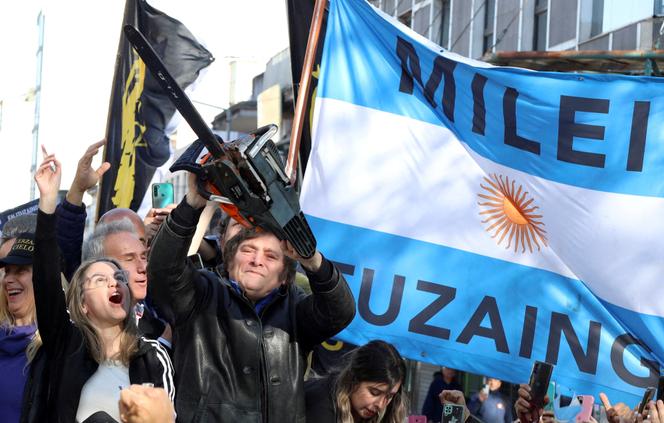


"I am the king, I am the lion!" In a chant verging on a roar, ultraliberal candidate Javier Milei harangued his supporters, packed into a concert hall in Buenos Aires for his end-of-campaign meeting on Wednesday, October 18. For three hours, the crowd of more than 12,000 people was whipped into a frenzy by refrains repeating the 52-year-old economist's bold ideas: replacing the national currency (the peso) with the dollar, closing the central bank, drastically cutting public spending and sharply reducing taxes.
"The caste [political elite] is afraid," Milei shouted, referring to the balance of power in the elections on October 22, when 36 million voters will cast their ballots in the first round of the presidential election to elect half of the country's MPs and 24 of its 72 senators. Most polls put him in the lead. For the first time in Argentina, an outsider has a chance of winning the presidency, in a country usually structured around two historical currents, Peronist and Anti-Peronist.
"Well, it's great, we're fed up with all these corrupt politicians," said Paola Hamasaki, 55, a self-employed digital marketing entrepreneur who had come to acclaim Milei. "He's the only one telling the truth. He has a real project for the country, for the long term," said this voter, who voted for the ultraliberal troublemaker back in 2021, the year he broke into the political scene and was elected MP. "I wear myself out working eight hours a day for pay that amounts to nothing at all," said Paola Gaitan, a 23-year-old cashier. "And during that time, there are people who stay in bed in the morning and receive welfare benefits. Politicians encourage laziness, not Javier Milei!"
Although Milei – who, if elected, will in any case not have a majority in Congress – insists that he will win right from the first round (with 45% of the vote, or 40% and a ten-point lead over the runner-up), all the polls contradict him. Facing him are Sergio Massa, 51, current economy minister and candidate of the center-left Peronist coalition (in power between 2003 and 2015, then from 2019 to today), and Patricia Bullrich, 67, former minister of security and candidate of the center-right coalition Juntos por el Cambio ("Together for Change"), which brought Mauricio Macri to the presidency from 2015 to 2019.
Most polls indicate that Massa should qualify for a second round, scheduled for November 19. "On December 10 [the day the elected president takes office], we will call for a government of national unity," he promised at a rally on October 17. Although Massa only took over the reins of the economy ministry in August 2022, in the minds of many voters he remains closely associated with the record of President Alberto Fernandez.
You have 56.25% of this article left to read. The rest is for subscribers only.
